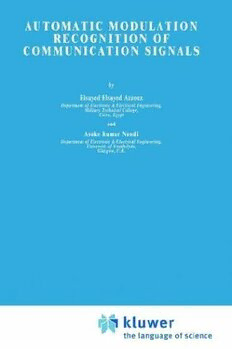Download Automatic Modulation Recognition of Communication Signals, 1st edition PDF Free - Full Version
Download Automatic Modulation Recognition of Communication Signals, 1st edition by Elsayed Azzouz, Asoke Kumar Nandi in PDF format completely FREE. No registration required, no payment needed. Get instant access to this valuable resource on PDFdrive.to!
About Automatic Modulation Recognition of Communication Signals, 1st edition
Automatic modulation recognition is a rapidly evolving area of signal analysis. In recent years, interest from the academic and military research institutes has focused around the research and development of modulation recognition algorithms. Any communication intelligence (COMINT) system comprises three main blocks: receiver front-end, modulation recogniser and output stage. Considerable work has been done in the area of receiver front-ends. The work at the output stage is concerned with information extraction, recording and exploitation and begins with signal demodulation, that requires accurate knowledge about the signal modulation type. There are, however, two main reasons for knowing the current modulation type of a signal; to preserve the signal information content and to decide upon the suitable counter action, such as jamming. Automatic Modulation Recognition of Communications Signals describes in depth this modulation recognition process. Drawing on several years of research, the authors provide a critical review of automatic modulation recognition. This includes techniques for recognising digitally modulated signals. The book also gives comprehensive treatment of using artificial neural networks for recognising modulation types. Automatic Modulation Recognition of Communications Signals is the first comprehensive book on automatic modulation recognition. It is essential reading for researchers and practising engineers in the field. It is also a valuable text for an advanced course on the subject.
Detailed Information
| Author: | Elsayed Azzouz, Asoke Kumar Nandi |
|---|---|
| Publication Year: | 1996 |
| ISBN: | 9780792397960 |
| Pages: | 231 |
| Language: | English |
| File Size: | 6.825 |
| Format: | |
| Price: | FREE |
Safe & Secure Download - No registration required
Why Choose PDFdrive for Your Free Automatic Modulation Recognition of Communication Signals, 1st edition Download?
- 100% Free: No hidden fees or subscriptions required for one book every day.
- No Registration: Immediate access is available without creating accounts for one book every day.
- Safe and Secure: Clean downloads without malware or viruses
- Multiple Formats: PDF, MOBI, Mpub,... optimized for all devices
- Educational Resource: Supporting knowledge sharing and learning
Frequently Asked Questions
Is it really free to download Automatic Modulation Recognition of Communication Signals, 1st edition PDF?
Yes, on https://PDFdrive.to you can download Automatic Modulation Recognition of Communication Signals, 1st edition by Elsayed Azzouz, Asoke Kumar Nandi completely free. We don't require any payment, subscription, or registration to access this PDF file. For 3 books every day.
How can I read Automatic Modulation Recognition of Communication Signals, 1st edition on my mobile device?
After downloading Automatic Modulation Recognition of Communication Signals, 1st edition PDF, you can open it with any PDF reader app on your phone or tablet. We recommend using Adobe Acrobat Reader, Apple Books, or Google Play Books for the best reading experience.
Is this the full version of Automatic Modulation Recognition of Communication Signals, 1st edition?
Yes, this is the complete PDF version of Automatic Modulation Recognition of Communication Signals, 1st edition by Elsayed Azzouz, Asoke Kumar Nandi. You will be able to read the entire content as in the printed version without missing any pages.
Is it legal to download Automatic Modulation Recognition of Communication Signals, 1st edition PDF for free?
https://PDFdrive.to provides links to free educational resources available online. We do not store any files on our servers. Please be aware of copyright laws in your country before downloading.
The materials shared are intended for research, educational, and personal use in accordance with fair use principles.

